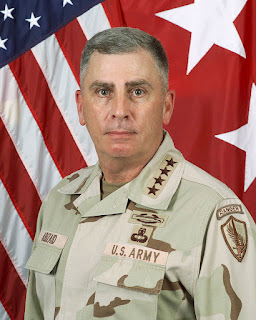A Lebanese American, Abizaid was born in northern California in 1951. His grandparents had immigrated to California from southern Lebanon during the late 19th century. His father, was in the Navy during World War II and raised him after Abizaid’s mother died of cancer.
Abizaid received his commission as Second Lieutenant of Infantry upon graduating from the West Point in 1973. After this he served in the 504th Parachute Infantry Regiment followed by: 82nd Airborne, the 1st & 2nd Ranger Battalions.
During the invasion of Grenada the decisions he made as a Captain would later be featured in the film Heartbreak Ridge by Clint Eastwood.
He was a U.S. Central Command(CENTCOM) commander, overseeing American military operations in a 27-country region.
Abizaid has had a glowing career in the military, having retired from the military on May 1, 2007 after 34 years of service as a four star General.
During his keynote at the Northern Ohio Lebanese American Association (NOLAA) Lebanese Heritage Ball with some thoughts on what it means to be Lebanese.
 |
| Abizaid was highly decorated even for a Flag Officer |



